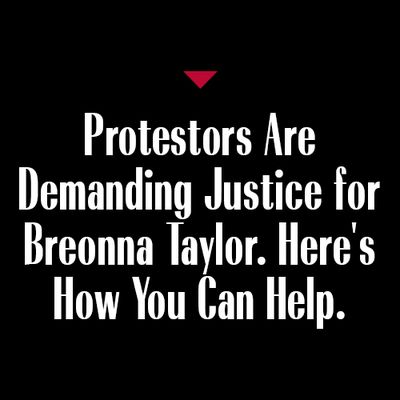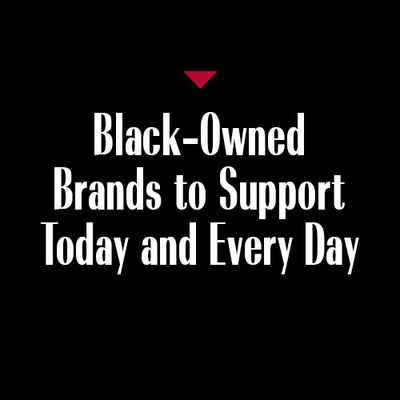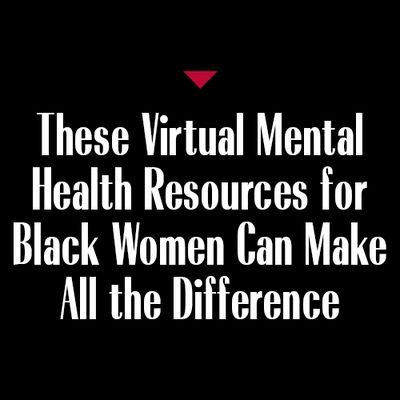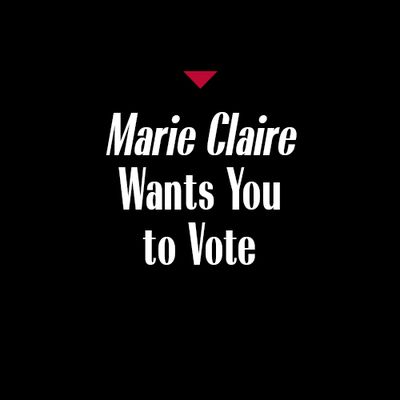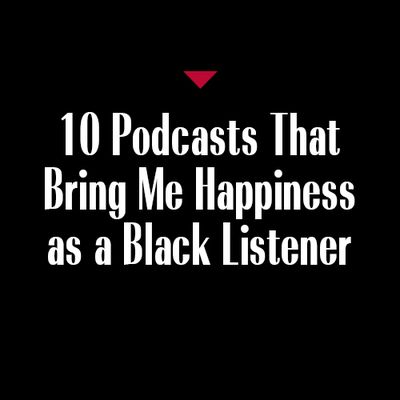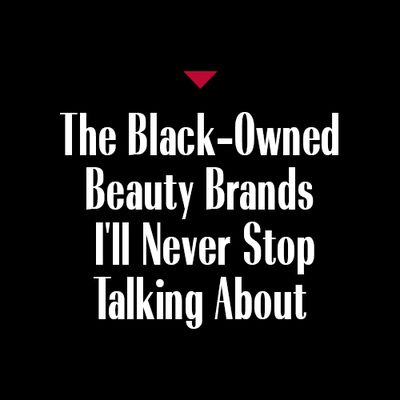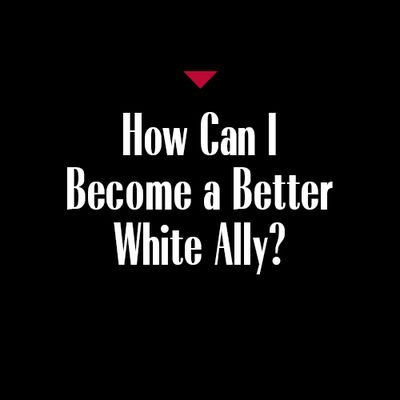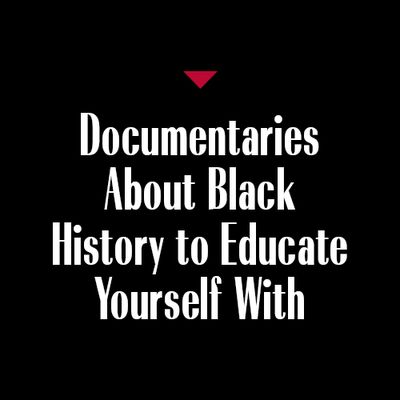Oge Egbuonu on Creating an Ode to Black Women With '(In)Visible Portraits'
"This is just the beginning of something that I'm hoping to cultivate that serves as a re-education to society."
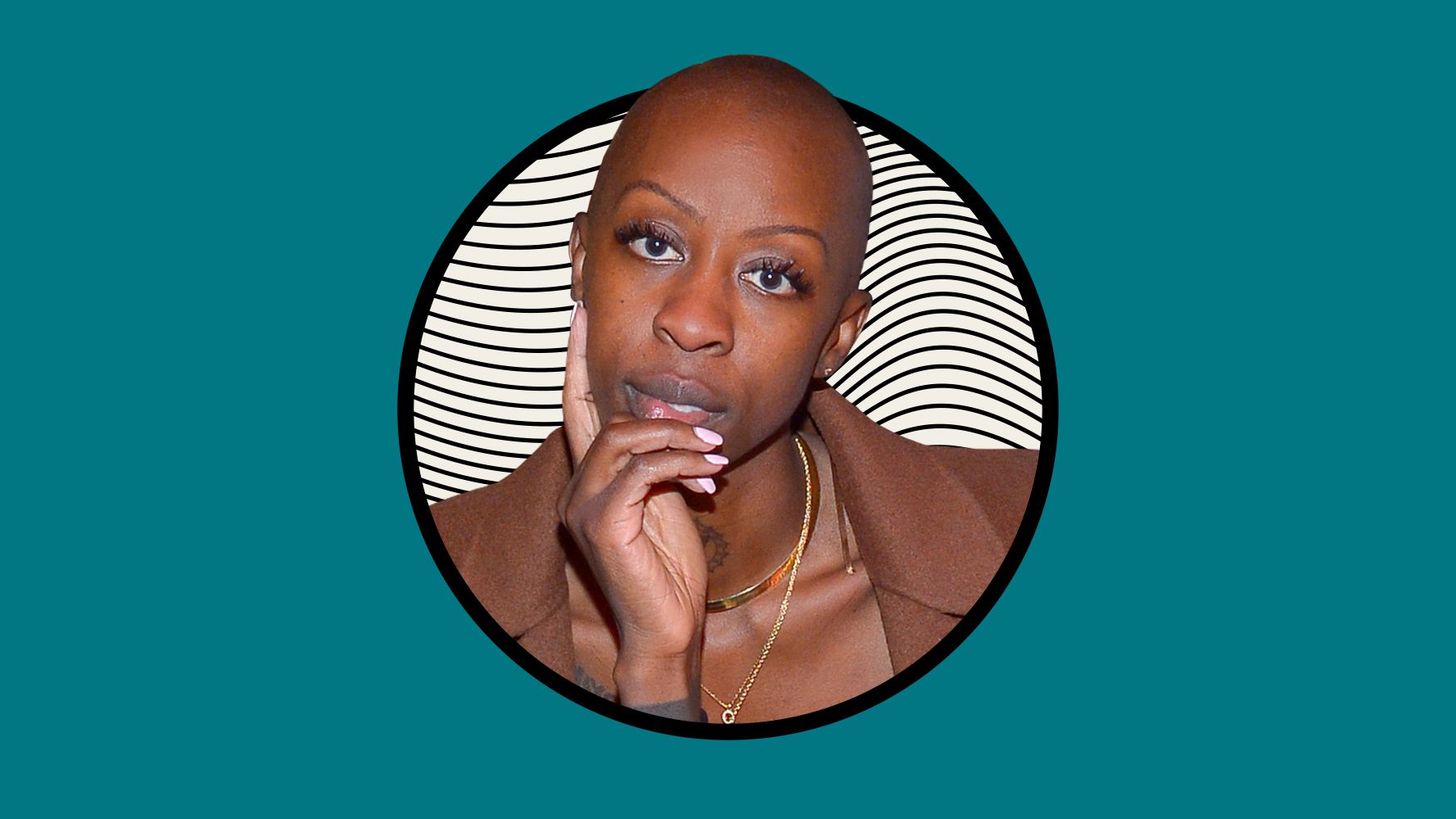
Oge Egbuonu is offering up a love letter to Black women from Black women. Her directorial debut, (In)Visible Portraits, launching on Vimeo on Demand today, is a poignant and quietly beautiful documentary. It aims to show how Black women got to where they are today, and where there is to go in a society that has historically benefited from their repression and shared trauma.
The film begins and ends with labels: angry, mother, jezebel, whore, beautiful, out of control, spiritual. Throughout the hour and a half, Egbuonu and the women featured documentary meticulously dismantle, clarify, and contextualize those labels in an effort to present a bigger picture who Black women really are. Egbuonu broaches a breadth of topics, from Karens to Beyoncés, from Black hair to "Mammies," which can at times seem too all-encompassing, a bit disjointed. Nonetheless, Egbuonu allows the women the space to paint themselves as three-dimensional people, instead of the just the words that have been thrust upon them.
Prior to her film's release, Marie Claire chatted with Egbuonu about the erasure of Black history, the power of releasing her film on Juneteenth, and why allyship isn't one-size-fits-all.
Marie Claire: How did the idea for this documentary come about?
Oge Egbuonu: The vision came to me in a meditation six years ago. I had never worked in film. At the time I was a yoga teacher in L.A. It came to me to do a documentary on black girls... A few years later a woman I met at a charity event sent me a text, randomly, that said, 'I know this guy. He has an idea about a project. I thought about you.' So I go to this meeting and it's this middle-aged white guy. He says, 'I was watching this clip of Isiah Thomas on YouTube, and he was being inducted into the Hall of Fame. And he was just crying about all the sacrifices his mother made for him to be where he's at. And it really moved me, and it made me realize there's nothing out there that celebrates Black mothers. I want to create something that celebrates Black mothers. Are you interested?' And I sat there thinking, No disrespect, but you're a middle-aged white guy. You want to do what? It was really baffling to me. And I said, 'If I am to do anything or be a part of anything I would want to do something that celebrates Black women. Because they are Black women before they are Black mothers.' I went away for a few days and came back and pitched an idea to him, and he loved it and [told me to go make it]. Initially, there was some doubt and fear in making it. I was contemplating saying no to the project, because I had never directed before. I had only produced. I had no clue what it meant to be a director.
MC: Was there anything you learned about Black women in the process of making this film that you didn't expect to?
OE: The entire film was a revelation to me. I went through about seven months of pre-production; six days a week, 14 hours a day of me just researching and reading about Black women. And I can honestly say 80 percent of what I learned I did not know. And I'm fighting so many different emotions [at the time] because I'm fighting rage about what I'm learning. I'm fighting anger and disappoint—disappointment in myself for not knowing. Feeling like I should know this history because I am a Black women. But also [I was] giving myself the space and tenderness. Telling myself, You wasn't taught this. How would you know if it wasn't taught to you? Everything in the film rearranged me and taught me something new.
I had no idea about J. Marion Sims, the "father of gynecology." He got that [title] from experimenting on Black women's bodies—with no anesthesia, against their will. I didn't know about [the history of] "Amazing Grace." And "Amazing Grace" is one of the most sung songs in Black churches. I didn't know about the seed of policing and how that's based off of slave patrols. And I thought, If I don't know this, my god, there's millions of other people who don't know this as well. Unless you're a historian or you studied African American studies, most people don't know this. Because what we're taught in schools is revisionist history. So I was just like, How do I take all this knowledge and anger and sadness and disappointment and allow it to fuel me to create something that's authentic and true?
MC: How did you come across the women you feature in the documentary, especially some of the younger girls who were so honest in their stories?
OE: I didn't know anybody in the film until I made it. The scholars and authors were people I researched. I reached out to all the scholars and authors and said, 'Here's my vision. Would you contribute your voice?'
Get exclusive access to fashion and beauty trends, hot-off-the-press celebrity news, and more.
As far as the everyday women and young girls, I had my assistant reach out to a few different nonprofits in L.A. that deal with Black communities, in particular Black women. There was one is particular, WLCAC, that I just fell in love with. And Sheila Thomas, who is in the film, is the executive director of that center. When I went to her, she looked at me with tears falling down and said, 'We need something like this. But let me be very transparent with you: People come into these communities all the time and exploit these peoples' stories...just to make these films and they don't get to know these women.' So she said, 'I can introduce you to these women who are a part of my community, but it's up to them to tell you their stories. You have to get to know them.'
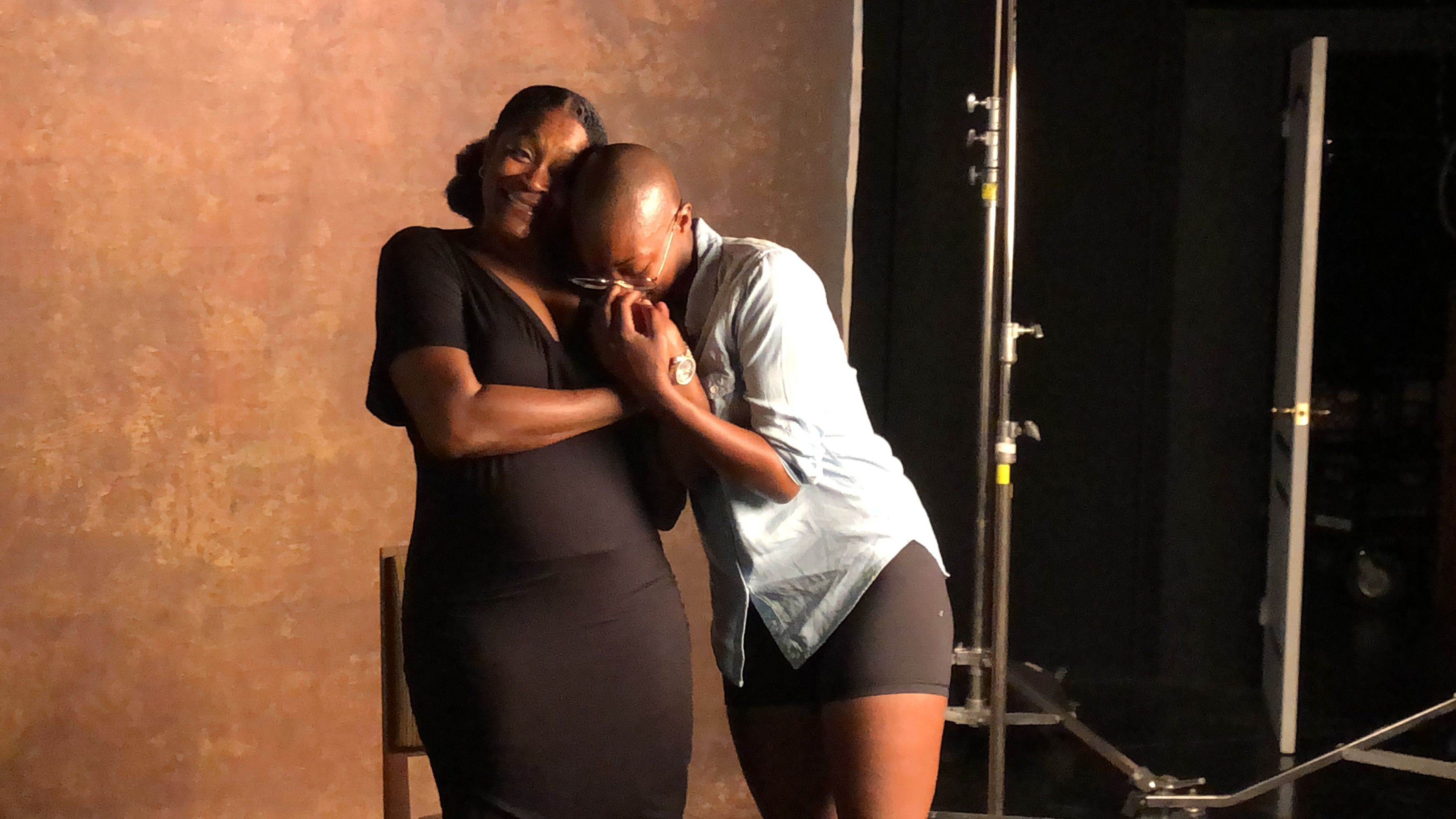
'Egbuonu (right) hugs Sheila Thomas, executive director of WLCAC. '
MC: You address so many topics—slavery, black hair, police brutality, Beyoncé—did you have that roadmap or were you adding topics as things were unfolding in the public discourse? Did you have a moment where you thought, Okay, I need to talk about Karens now?
OE: I did production for two months—production started in July 2018. So the term of "Karens" wasn't a thing yet. As I was doing research, I started to cultivate questions that I wanted to ask the scholars. The way the film is laid out... I didn't know how to tell the story because there was so much I was learning. So I was thinking, How do you tell all of this in 90 minutes? I had a really random idea one day, after meditation, to text some of my friends. I thought, Let's text every Black guy we know and ask them: 'If you could describe Black women in three words what would they be?' I got about 100 responses. All the words I got, I wrote them down on a big canvas sheet—if I got "angry" 25 times, I'd write it down 25 times—and I just stared at it for a month. I always came back to [the canvas] as I was researching. Three words kept popping up: 'hurt,' 'beautiful,' and 'resilient.' And I was like, Oh, let me try to tell the story through these three words.
With 'hurt,' I wanted to talk about the hurt in a three-dimensional aspect: the physical hurt, the mental hurt, and the emotional hurt. And so the physical was all about the medical apartheid that's been done on Black women's bodies, the rape of Black women, all that slavery did to the bodies of Black women in society as a whole. And then the mental aspect was the labeling of Black women from 'gold digger' to 'welfare queen' to 'Mammie.' And the emotional hurt is how I wrapped it up. Once you've been hurt mentally and physically, how does that affect you on an emotional level? And how does that also affect you with other Black women and society as a whole?
With the 'resiliency' section, it was through the research that I learned that resiliency can be used as a double-edged sword. So I wanted to highlight that but also highlight how faith played a role in that—whether through spiritual singing or Christianity or whatever the role of faith looked like. How faith kept Black women going. And, because I knew the first two sections were heavy, I wanted to end on a celebratory note. And just celebrate the beauty of Black women; physical beauty but also the beauty of the mind and all the contributions Black women have made to society.
MC: Was there anything that didn't make the cut that, from a 2020 lens, you wish you could've included?
OE: There's so much. We have more than 35 hours of footage. For me, this is just the starting point. The hope is it turns into a docu-series. We're creating curriculums to get into universities, because a lot of universities are asking to license [the film] to make it a mandatory requirement for incoming freshmen. This is just the beginning of something that I'm hoping to cultivate that serves as a re-education to society.
There was this notion of not feeling worthy enough to look at yourself in the mirror and say, 'I love you. You matter. I see you. I hear you.'
MC: What was the most difficult thing to discuss with all the subjects?
OE: The idea of Black women feeling like they were worthy was really hard. The moments that hit me the most were when I had them look in the mirror and talk to themselves. We had to do many takes because that was very, very hard for every single person. Because: A) They had never done that before and B) There was this notion of not feeling worthy enough and not feeling beautiful enough to look at yourself in the mirror and say, 'I love you. You matter. I see you. I hear you.' It was difficult to witness that. My whole crew was in tears. And I was very intentional to make sure my crew was a crew of all women. I'm glad I did make that decision because we cultivated a space that was very soft and tender that allowed these women to be vulnerable.
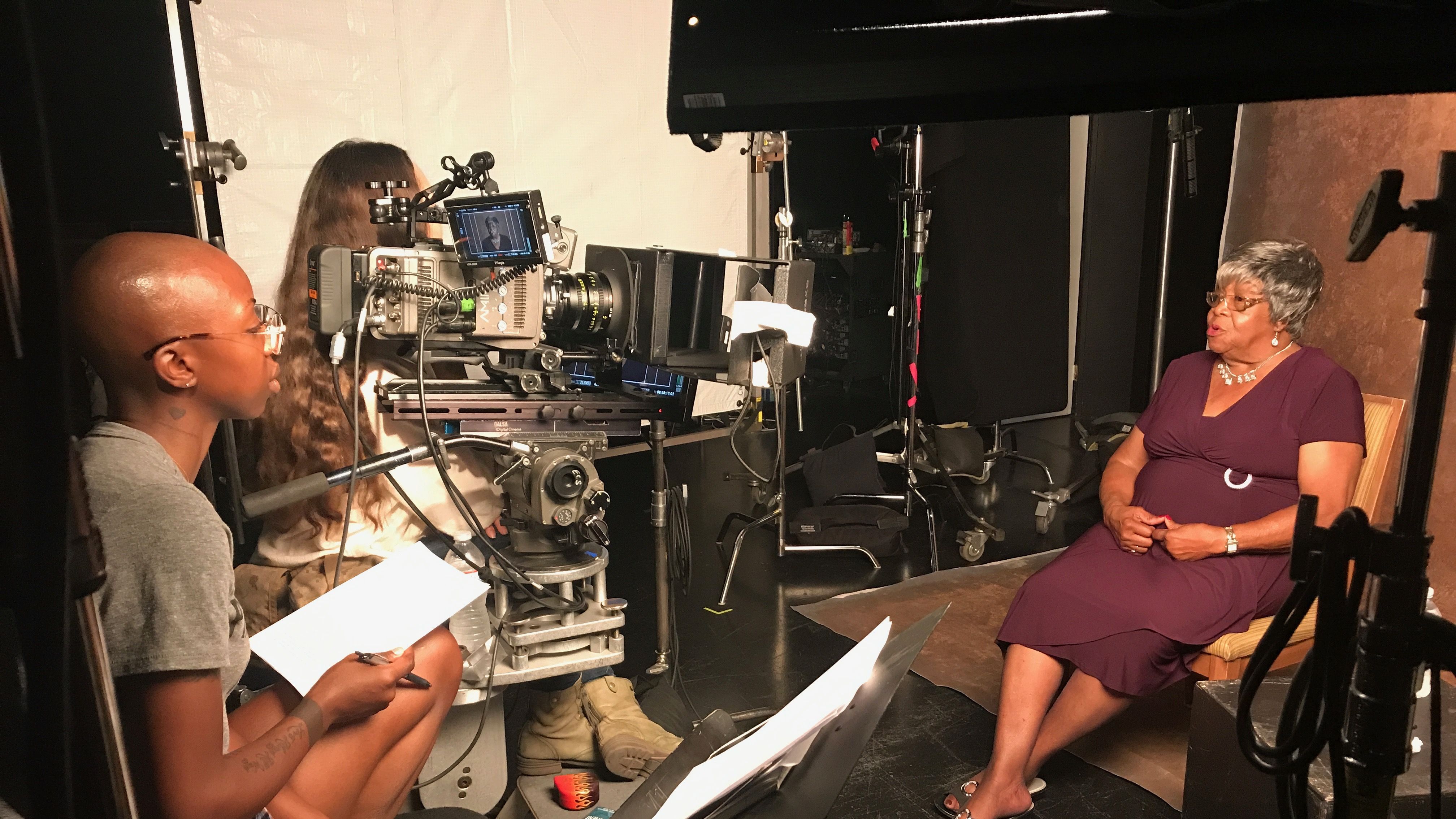
'Egbuonu (left) interviews Cora Matthews.'
MC: An unexpectedly powerful moment was when you draw a chart on screen that lays out how Black women are subjugated by both racism and sexism.
OE: It came from Dr. Joy DeGruy. Her book, Post Traumatic Slave Syndrome, rearranged me. I read it twice, and I was sobbing each time I read it. As I got to know her, she said, 'I don't think people realize what it truly means to be a Black woman. We are, or we're perceived to be, the mules of the world.' And I said, 'What do you mean?' And she started telling me what you see in that chart. And I was like, Holy shit. I need to make a chart of that. I think, typically, people see things and it clicks. Which is why this film works. Because you're hearing these stories, but you're also visually experiencing these women and these stories. That's what makes it have a very powerful impact.
MC: What does it mean to you to be releasing your film on Juneteenth?
OE: Initially, I was going to self-distribute in the fall. But in May, when all the things started to happen with Ahmaud Arbery's case, and a week later, Breanna Taylor, and then a few weeks later, George Floyd, I was like, This film needs to come out sooner rather than later. I started to realize we were in this collective space of reimagining. People were so hungry to question the way society is constructed; question the way they've been taught to show up in the world. So I knew I needed to move it up and Juneteenth just made sense to me.Even though Juneteenth is really big in the South, most people don't know about it—even to this day. So now not only can this film serve as a re-education, releasing it on that day gives voice to that holiday and the importance of what that really means.
MC: What do you hope that the allies watching your film take away from it? What does a good ally look like to you?
OE: Allyship looks different for everyone. When people see the film, the first thing I get asked is, 'What do I do?' And my answer is the same: 'It's not for me to tell you what to do.' That's the work that each person has to do. My hope is when people see the film they do some deep self-reflection, and by doing that they realize what they need to do to show up in a way that benefits and serves the highest good for all. Because what I need in an allyship might look completely different than what my friend needs in an allyship. At the end of the day, it goes back to what Gil Scott-Heron said: 'The revolution won't be televised.' What he meant by that is the revolution has to happen in the mind first, before it happens in the exterior. You have to do the work internally before you can show up for liberation for everybody else. I can't guide you through that. I can hold space for you while you figure it out, but at the end of the day, that is some deep self-reflection that each individual has to do. And I think right now we're in the space when people are ready to do that work.
Read More About Racism & Allyship
Neha Prakash is Marie Claire's Entertainment Director, where she edits, writes, and ideates culture and current event features with a focus on elevating diverse voices and stories in film and television. She steers and books the brand's print and digital covers as well as oversees the talent and production on MC's video franchises like "How Well Do You Know Your Co-Star?" and flagship events, including the Power Play summit. Since joining the team in early 2020, she's produced entertainment packages about buzzy television shows and films, helped oversee culture SEO content, commissioned op-eds from notable writers, and penned widely-shared celebrity profiles and interviews. She also assists with social coverage around major red carpet events, having conducted celebrity interviews at the Met Gala, Oscars, and Golden Globes. Prior to Marie Claire, she held editor roles at Brides, Glamour, Mashable, and Condé Nast, where she launched the Social News Desk. Her pop culture, breaking news, and fashion coverage has appeared on Vanity Fair, GQ, Allure, Teen Vogue, and Architectural Digest. She earned a masters degree from the Columbia School of Journalism in 2012 and a Bachelor of Arts degree from The Pennsylvania State University in 2010. She lives in Manhattan with her husband and dog, Ghost; she loves matcha lattes, Bollywood movies, and has many hot takes about TV reboots. Follow her on Instagram @nehapk.
